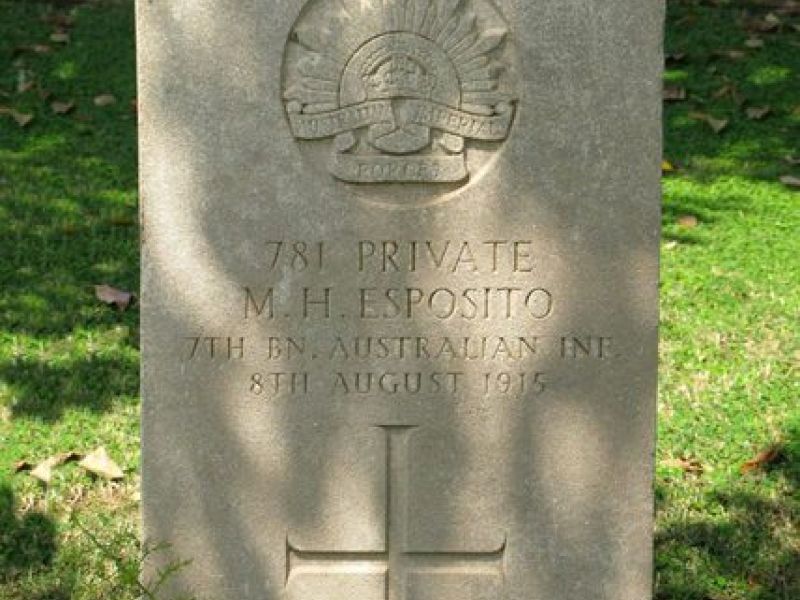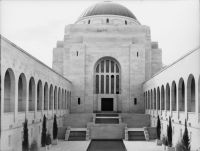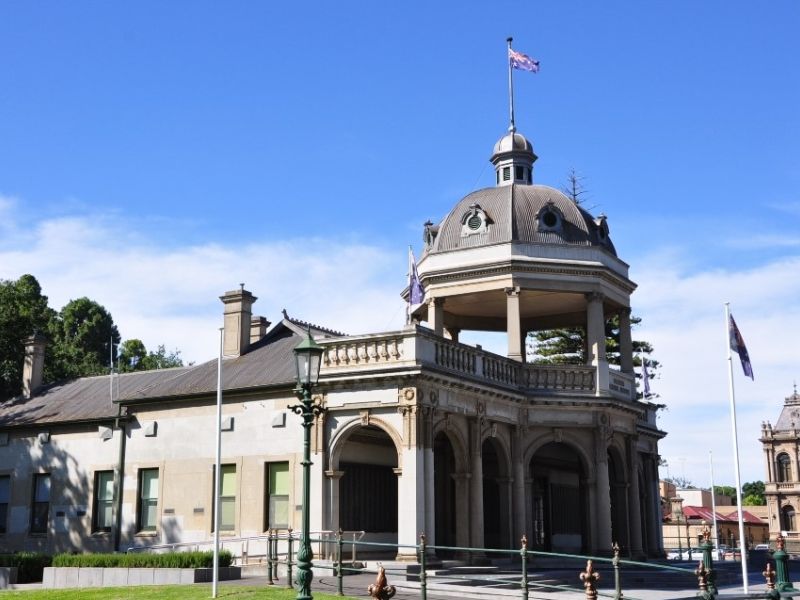Private Mervyn Harold Esposito, 7th Battalion, AIF
Mervyn Esposito, known to his family as “Mooty”, was born in 1894 to Frank and Mary Esposito of Eaglehawk, Victoria. His father was the licensee of the Cricketers’ Arms Hotel in Eaglehawk. Mervyn attended the local state school before going on to work as a tailor for a prominent establishment in Eaglehawk. Mervyn was an elocutionist, and won a number of prizes at the Borough Band’s musical and elocutionary competitions. He was a member of the dramatic club, a member of the Australian Natives’ Association, and a regular attendant at the Eaglehawk Presbyterian Church.
Mervyn Esposito enlisted in the Australian Imperial Force within weeks of the outbreak of war in August 1914. He underwent a short period of training before leaving Australia with the first contingent the following October. During the voyage and in the months that followed he was nominated to be batman to Captain Herbert Hunter of the 7th Battalion, a well-known sportsman turned soldier.
In the early hours of 25 April 1915, the 7th Battalion landed on Gallipoli in the near dark and raced for the heights. After days establishing a defensive position and reorganising, the men of the 7th Battalion were given orders to attack the Turkish front line on 8 May. During the operation, Captain Hunter was killed by a Turkish bullet while having wounds to his feet treated.
By June the vicious back and forth fighting had died down into a tense stand-off. As summer came in, the health of the Australian soldiers began to suffer, with many suffering from diseases such as influenza and enteric fever. In early July Private Esposito was evacuated from the peninsula by hospital ship with influenza. In mid-July a sister at the hospital wrote to the Esposito family to let them know that Mervyn was improving daily. The day after the family received this letter, however, they had a visit from the Reverend Davidson to tell them their son was dead. While the letter from the nurse was in transit to Australia, his condition worsened. He had contracted enteric fever, and died in hospital in Cairo on 8 August 1915.
Mervyn’s brother Ben had been in Cairo with the 21st Battalion since June, but did not find out about Mervyn’s illness until it was too late. He later wrote, “he was in Cairo a month, and I was unable to find it out… He came from Gallipoli … poor lad, he was broken up. His nerves were racked to pieces and [he] was run down. He had been too long at Gallipoli, and when the fever got him he could not shake it off.”
Mervyn had been buried before Ben heard of his death, and the best Bem could do was to visit his brother’s grave and put flowers on it a few weeks later. In a letter of consolation to his parents, Ben wrote, “it is awful, but remember [dear old “Moot”] died for his country. Thank God he was a good, clean lad. If there was a more loving son or a better brother I never met him … Bear your cross, as he died as a soldier for his country.”
Mervyn remained in Ben’s mind as he continued to serve, and the next year Ben wrote to his parents, saying “if anything happens to me, do not worry, but think of the rest of the dear kids, and perhaps I’ll see dear “Mooty” again.”
Mervyn Harold Esposito was buried in the Cairo War Memorial Cemetery with full military honours. Today he lies under the simple epitaph, “greater love hath no man”. He died 16 days before his 21st birthday.
- AWM Roll of Honour https://www.awm.gov.au/collection/R1723099

 Australian War Memorial
Australian War Memorial